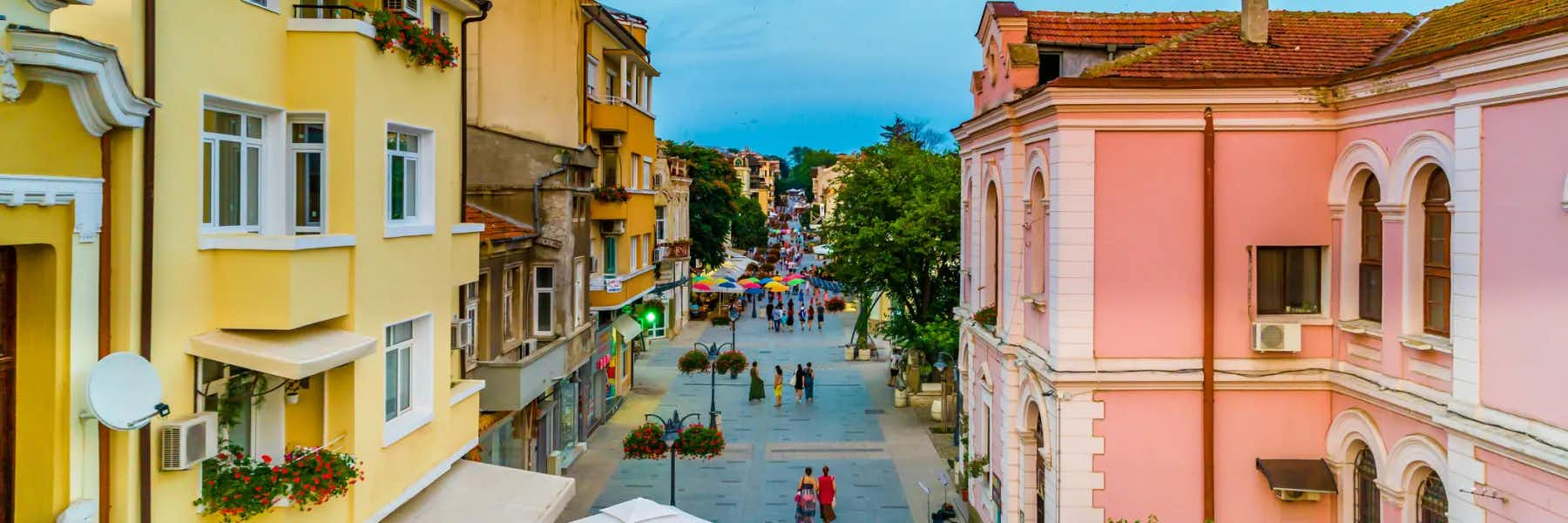A sunny fall Sunday on Knyaz Aleksandar Boulevard was like Paris 30 years ago. Along the wide, tree-filled, pedestrian-only street in Plovdiv, couples, friends, and families sit at umbrellaed sidewalk cafes conversing, sipping coffee, munching banitsa, and enjoying the last sunny days of autumn.
Flower shops and marquees dotted the thoroughfare with vivid blooms. Small retail shops bordered the boulevard. Street vendors selling clothing, jewelry, leather goods, and an assortment of merchandise were doing brisk business.
The air was filled with the aromas of roasting meat, steaming corn, baking bread, and pastries. Bulgarian, European, and Middle Eastern cuisine was available in cafes, restaurants, kiosks, and from street vendors.
We walked through history, art, culture, and the ruins of Roman stadiums, libraries, and shops, all of which were part of the everyday routine of the residents of Plovdiv. We wondered if Bulgaria might be the next destination in our nomadic retirement.
Why Were We in Bulgaria?
Our eight-week tour of Bulgaria was planned to give us a new destination for our travel writing retirement career. We needed new material for our editors, and many publications haven’t covered Bulgaria. After researching the country and learning about the cost of living and travel there, we booked our flights and packed.
Our eight weeks in Bulgaria included seven cities and towns, with terrain including the Black Sea Coast, mountains, valleys, and plains. The country's beauty held our hearts. In each location, we stayed in vacation rentals and lived like locals. We shopped in small shops and farmer’s markets, buying and cooking local food. We often sat in sidewalk cafes, watching folks pass by. We immersed ourselves in art, history, and modern culture. We immediately began talking about Bulgaria as our next nomadic retirement destination.
Where to Live in Bulgaria
Four Popular Cities for Expats
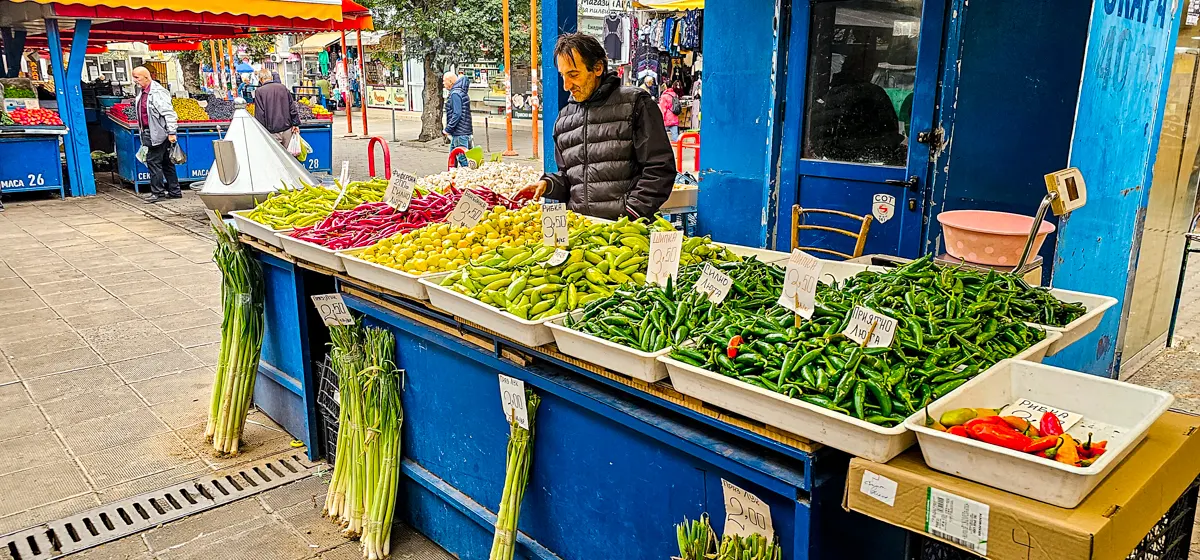
Sofia — Sofia, the capital city of Bulgaria, is a vibrant and dynamic place to call home. The city is rich in history, culture, and entertainment, making it a popular destination for ex-pats and nomads. The city is known for its stunning architecture, beautiful parks, lively art scene, enormous city market, and delicious cuisine.
Sofia is also a budget-friendly city with a low cost of living and affordable housing. The city’s public transportation system is efficient and reliable, making it easy to get around. Whether you’re interested in exploring museums, trying new foods, or simply enjoying life in a bustling metropolis, Sofia is a lovely destination.
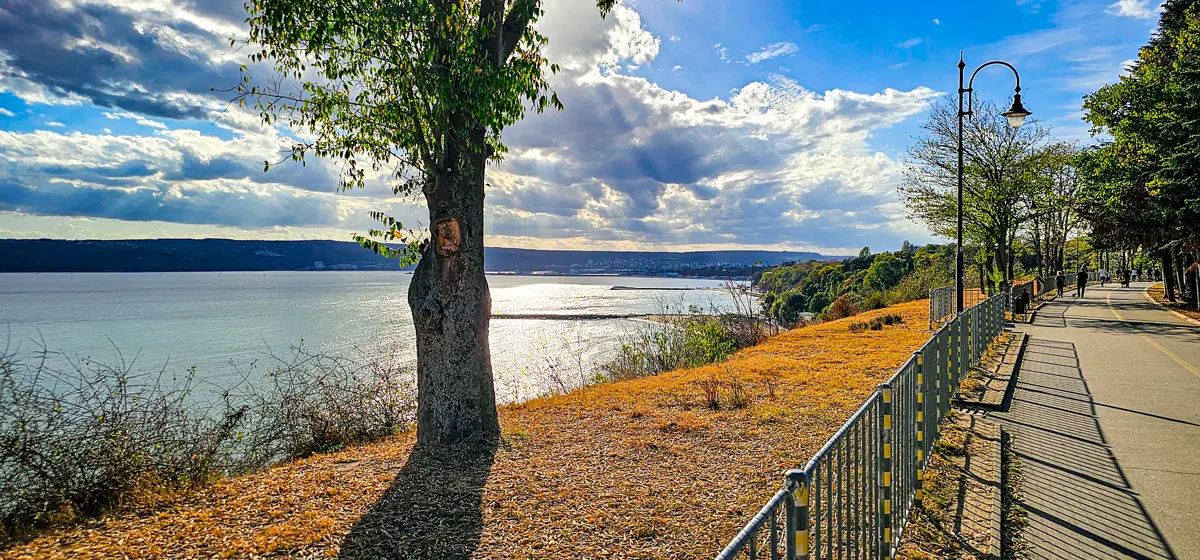
Varna — Located on the Black Sea Coast, Varna is Bulgaria’s third-largest city and a popular destination for international tourists and ex-pats. Varna offers a relaxed, laid-back lifestyle with modern amenities and historic charm. The city has abundant green space, exquisite parks, beautiful beaches, lively nightlife, and annual cultural events.
The cost of living is affordable, and the city is easy to navigate with a good public transportation system. There are plenty of opportunities for outdoor activities such as hiking, biking, and water sports. Varna is a great place to relish a comfortable and pleasurable life.
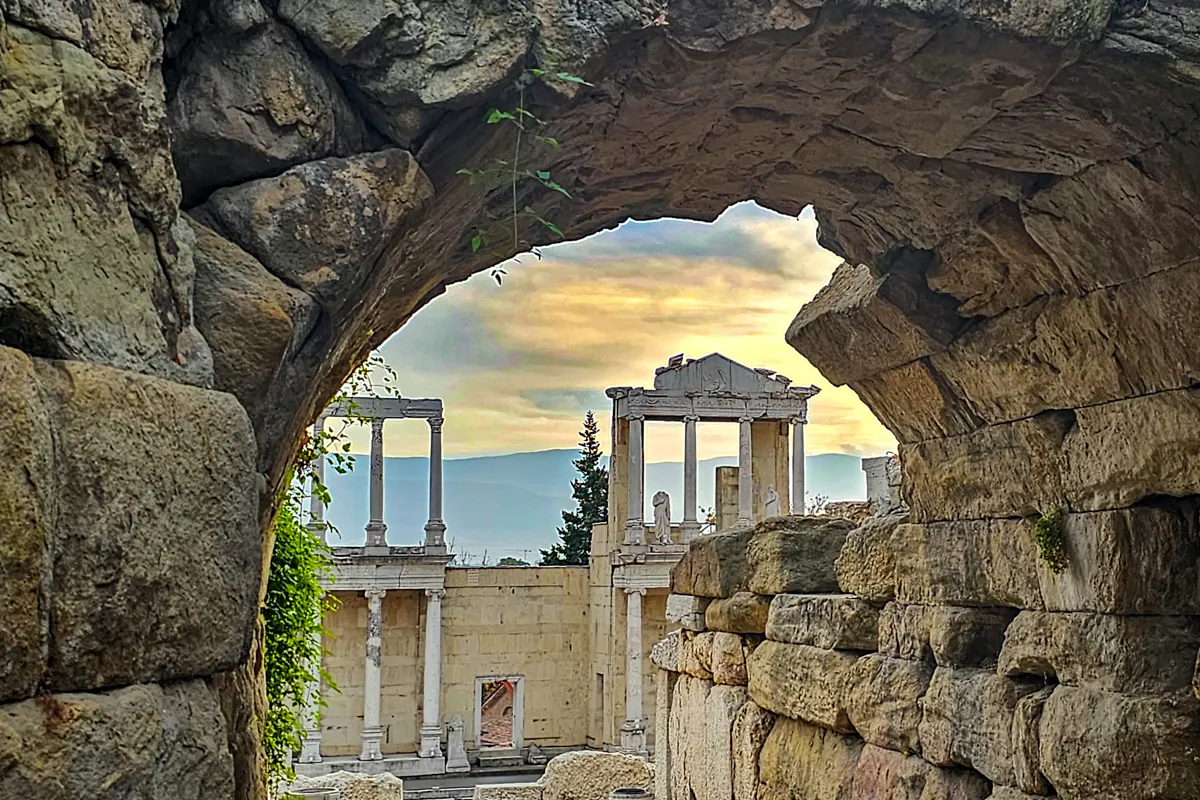
Plovdiv — Designated the 2019 European Capitol of Culture, Plovdiv, the second-largest city in Bulgaria, has a prolific and diverse cultural scene. Plovdiv has a fascinating blend of history and contemporary culture, from ancient Roman ruins to modern art galleries. The city is home to several museums, including the Ethnographic Museum, which showcases Bulgarian folk art and crafts, and the Regional History Museum, which highlights the city’s history from Neolithic times to the present day.
Plovdiv is also known for its vibrant music scene, with numerous festivals and concerts featuring local and international artists yearly. Whether you’re interested in history, art, or music, Plovdiv has something to offer.
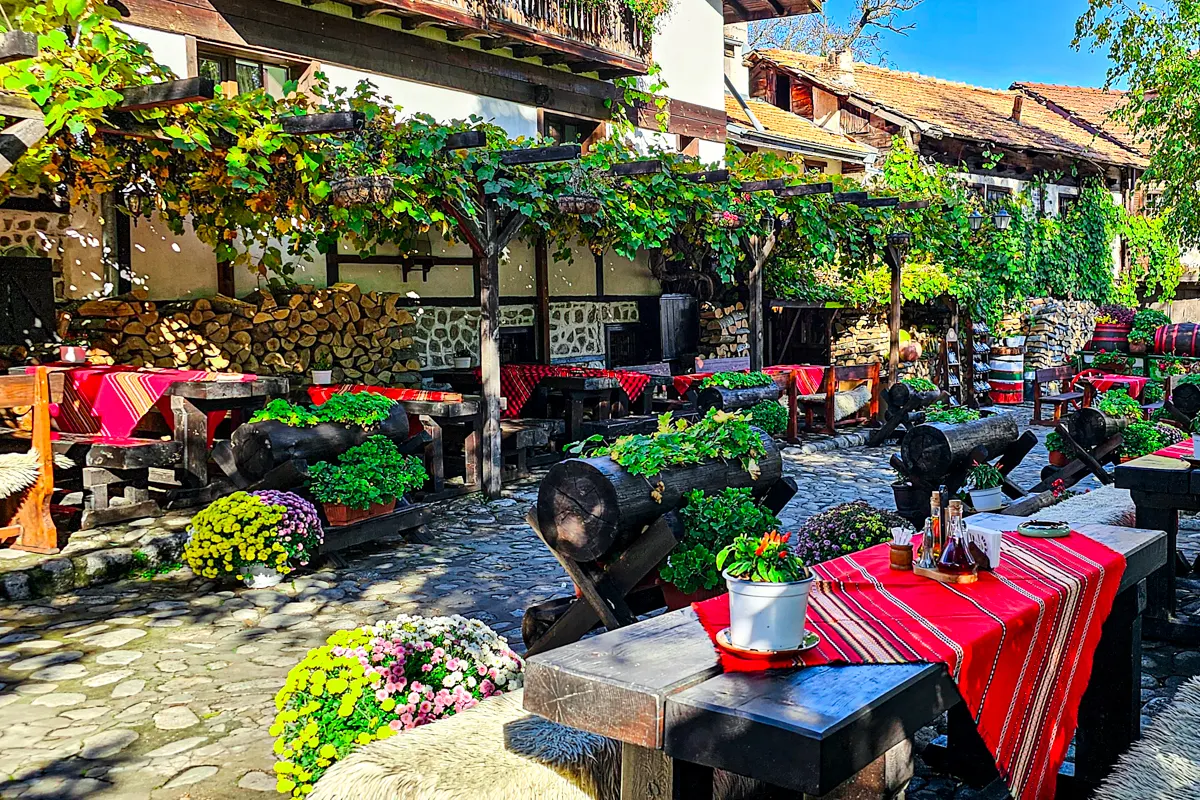
Bansko — Bansko, located in southwestern Bulgaria, is a charming town in the Pirin Mountains at 3035 feet. It is popular among tourists for its beautiful scenery and ski resorts. Life in Bansko is laid-back and relaxed, with friendly locals and a great sense of community.
The town has a strong history and lively culture, with traditional Bulgarian architecture, cobblestone streets, museums, and festivals. The cost of living is reasonable, and the town offers a good selection of local and international restaurants. With its jaw-dropping natural beauty, peaceful atmosphere, and ample opportunities for outdoor activities, Bansko is a great place to call home in warm, sunny summers or chilly, snowy winters.
Cost of Living in Bulgaria
48% Less Than the US
The cost of living in Bulgaria delighted us. We shopped for groceries at both small food shops and supermarkets. Prices would often cause us to look at each other and giggle. A beautiful three-pound pork roast - $4.50, a pound of local tomatoes – 50¢, a pound of butter - $2, 10 eggs - $1.50, 12-ounce local yogurt 63¢, one pound of potatoes – 50¢. A box of 20 quality Earl Grey tea bags – 75¢. A bottle of local prosecco was $3.00. Delicious Bulgarian red or white wine was $2.00.
Our one and two-bedroom vacation rentals ranged from $19—32 per night depending on location and size. We investigated the cost of long-term rental apartments and utilities in each location where we stayed. Rent was higher in the larger city centers than in the outlying areas.
| Average Expenses Per Month | US$ |
| Rent for a 900 sq ft furnished apartment in an expensive area | 672 |
| Utilities -water, electricity, and gas for two people in a 900 sq ft flat | 136 |
| High-speed Internet | 15 |
| Cellphone – 4G network | 18 |
| Cable | 13 |
| Public Transit | 15 |
| Groceries for two | 465 |
| Entertainment for two—dining out, historic sites, museums, concerts, festivals, sports clubs, and day trips | 260 |
| Misc. | 50 |
| Monthly Total | $1,644 |
Shopping
Shopping was initially challenging because of unfamiliar products and Bulgarian-language-labeled items. But we adapted quickly and couldn’t have done it without Google Translator.
Most retailers are small shops specializing in one thing, like meat, cheese, bakery, or groceries. The same applies to clothing, shoes, household goods, hardware, etc. Like in any country, imported goods are higher priced than Bulgarian-produced goods. Other than Coca-Cola and liquor, we saw very few American products.
Get Your Free Report on the World's Best Places to Retire in 2026
Get Your Free Report on the World's Best Places to Retire in 2026
Simply enter your email address below to sign up for our free daily postcard e-letter and we'll also send you a FREE report on The World's Top 10 Retirement Havens for 2026.

By submitting your email address, you will receive a free subscription to IL Postcards, Overseas Dream Home, The Untourist Daily and special offers from International Living and our affiliates. You can unsubscribe at any time, and we encourage you to read more about our Privacy Policy.
Lifestyle in Bulgaria
Language
Bulgarian is the national language and is written in the Cyrillic Alphabet. Younger people speak English because it is taught as the International Business Language in school. Older people speak some English, but English isn’t spoken commonly in more remote regions.
After six weeks, we could say common phrases like hello, goodbye, please, thank you, and white wine in Bulgarian. We found many restaurant menus were in both Bulgarian and English; if not, we relied on our Smartphone translator to help us order.
Most folks did their best to help us with the language. The Cyrillic Alphabet was the real challenge, as we didn’t know how to pronounce the unknown characters. Thank goodness for our translator and the ubiquitous Wi-Fi we utilized everywhere.
Transportation
Air — Bulgaria has eight airports serviced by regular international flights. Among these airports, Sofia Airport is the busiest, just over 10km from the city center. Plovdiv Airport and Varna Airport follow closely in passenger traffic, handling around half the number of passengers passing through Sofia Airport.
Auto — As with any country, an automobile is expensive to own and operate. Fuel averages $1.57 per liter. Roads are excellent, with well-maintained, high-speed motorways, secondary roads, and city streets. Road signs are in Bulgarian and English.
Trains — Bulgaria has a well-developed but older railway system. While passenger cars are a bit dated, they are clean and well-maintained. Highspeed locomotives pull the direct route cars. More local trains still use older, slower locomotives. We took the train once, crossing the country from Sofia to Varna. It was a beautiful, scenic ride through the mountains. The cost for our train trip was $12 each for First Class.
Bus — Most locals recommend buses over trains. They are a bit faster and have more schedule options and destinations. We decided to take a bus on our return from Varna to Sofia for the experience and because it was easier to handle our bags (no lifting large suitcases into an overhead rack on the train). The cost for our bus trip was $21 each for standard seating.
Taxis — Taxis are generally very reasonable. However, in tourist areas, be careful and ask the driver to turn on the meter. Some like to overcharge. Apps like Uber and Bolt are not used in Bulgaria. Instead, individual taxi companies have their own apps. I suggest using them when available.
Cycling and Walking
Walking and cycling are prevalent everywhere. Most towns and cities have bike lanes, plus pedestrian-only shopping boulevards, sidewalks, and walking paths. They are strollable, wide, and tree-lined, with places to sit, parks, and playgrounds, not to mention sidewalk cafes for coffee and conversation.
Location
Bulgaria is in southeastern Europe and shares borders with Turkey, Greece, North Macedonia, Serbia, and Romania. It is situated on the eastern side of the Balkan Mountains and is bordered by the Black Sea to the east.
There are trains, planes, and busses to neighboring countries and the rest of Europe, making day trips and weekend getaways easy and economical.
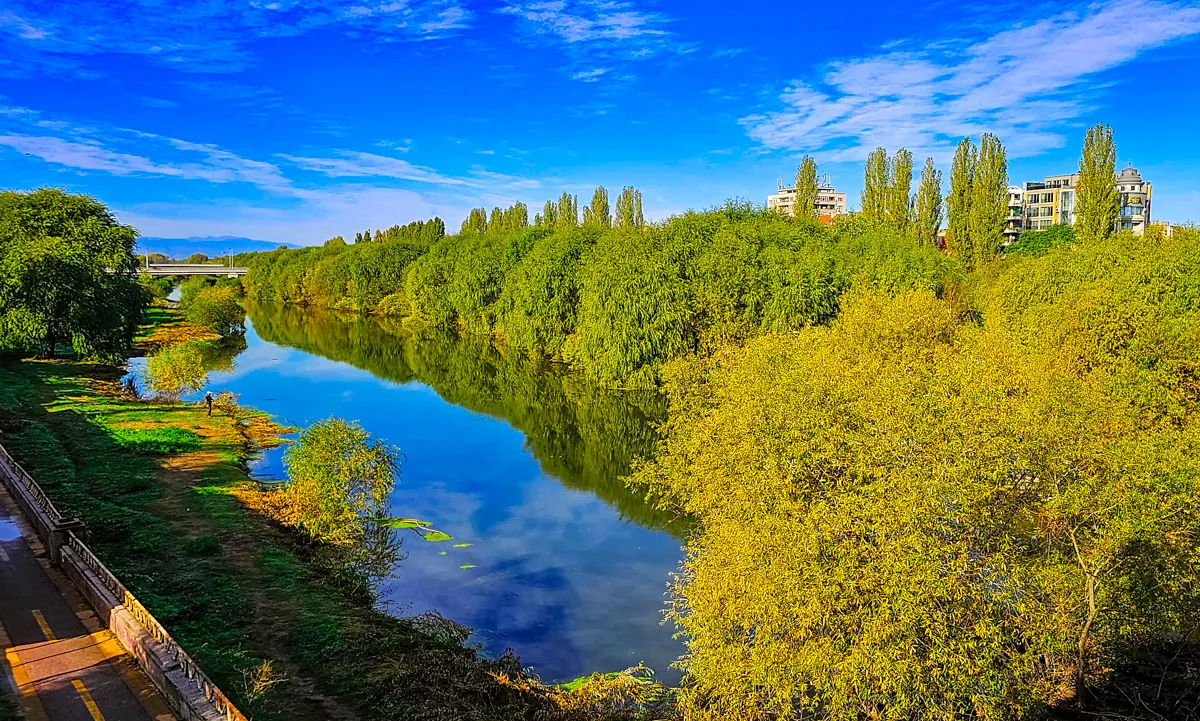
Entertainment and Things to Do
If you are a history buff, Bulgaria is your Nirvana. Bulgaria’s history spans over 13 centuries, with periods of great power and decline. It was once a mighty empire, conquered by the Ottomans, and later became a communist state. Today, it is a democratic republic and a member of the EU.
Thirteen centuries of history are revered and preserved in every city and village of the country. We especially liked the ancient Roman cities and buildings that have been excavated. In Sofia, one of the main pedestrian walkways is an ancient Roman road that hundreds walk daily to and from the train station.
Bulgaria offers a wide range of entertainment options and things to do. From exploring the country’s rich history while visiting museums and ancient ruins to enjoying the beautiful beaches of the Black Sea Coast, all tastes and budgets will find something to do. The nation is also home to many vibrant festivals and events throughout the year, including music festivals, cultural celebrations, and sporting events. Those who love the outdoors will find plenty of opportunities for hiking, skiing, and other outdoor activities in the country’s beautiful mountains.
Dining out in Bulgaria is a pleasing experience for those who appreciate local and international flavors. The country’s cuisine offers diverse dishes, like Sach, meat, and vegetables cooked at your table, full-bodied stews, barbequed meats, huge salads, and seafood. The national dish, the Shopska Salad, is a mixture of tomatoes, cucumbers, onions, fresh goat cheese, and greens. Whether in a trendy restaurant or a cozy traditional tavern, you’ll find delicious food at affordable prices.
Get Your Free Report on the World's Best Places to Retire in 2026
Get Your Free Report on the World's Best Places to Retire in 2026
Simply enter your email address below to sign up for our free daily postcard e-letter and we'll also send you a FREE report on The World's Top 10 Retirement Havens for 2026.

By submitting your email address, you will receive a free subscription to IL Postcards, Overseas Dream Home, The Untourist Daily and special offers from International Living and our affiliates. You can unsubscribe at any time, and we encourage you to read more about our Privacy Policy.
Climate in Bulgaria
Bulgaria’s climate is diverse, with hot summers and cold winters. Coastal areas have a Mediterranean climate, while inland regions have a moderate climate.
Visa and Residence in Bulgaria
Several visa and residency plans exist for non-EU citizens wishing to live in Bulgaria. Upon entry, you are automatically granted a 90-day stay. You can apply for visas that give a 6- or 12-month stay. There are also visas for ‘pensioners’ wishing to retire in Bulgaria. Requirements are easily fulfilled. Learn more at Visa For Bulgaria.
Healthcare in Bulgaria
The national healthcare system in Bulgaria is government-funded and provides universal coverage to all citizens and legal residents. However, the system is often underfunded and understaffed, resulting in long wait times. Citizens and residents often have supplemental private insurance from private providers. Non-resident Foreign Nationals are required to have private insurance until they become permanent residents.
Why Retire in Bulgaria?
Bulgaria offers a beautiful setting with affordable living costs, a rich culture, and many opportunities to explore. The country’s stunning Black Sea Coast, mountains, valleys, and plains provide a range of natural beauty. The cost of living in Bulgaria is significantly lower than in the United States, making it an attractive option for retirees on a budget.
The country’s mix of modern and traditional culture is also a draw, with history, art, and cuisine all available to explore. Whether looking for a laid-back seaside lifestyle or a sunny and vibrant city, Bulgaria offers something for a permanent or nomadic retirement life.
PS — What is a Nomadic Retirement Home
It’s pretty simple, and you have probably figured it out. Nomadic retirees wander from place to place rather than stay in one location.
We are digital nomads living in Gozo, Malta. Our initial ‘try-out’ commitment was for one year. We love it, so we added a second year. But we want to immerse ourselves in other countries and try different cultures for a year or two. Before we decide on our next move, we will spend extended time exploring and living like locals in places that catch our fancy. Bulgaria may be next.
Get Your Free Report on the World's Best Places to Retire in 2026
Get Your Free Report on the World's Best Places to Retire in 2026
Simply enter your email address below to sign up for our free daily postcard e-letter and we'll also send you a FREE report on The World's Top 10 Retirement Havens for 2026.

By submitting your email address, you will receive a free subscription to IL Postcards, Overseas Dream Home, The Untourist Daily and special offers from International Living and our affiliates. You can unsubscribe at any time, and we encourage you to read more about our Privacy Policy.
